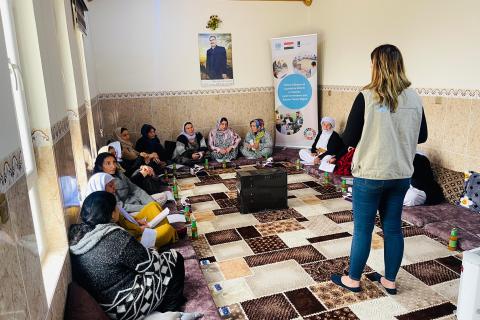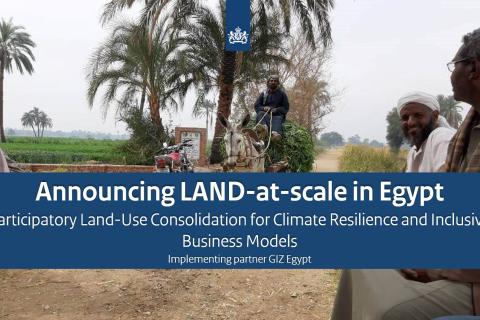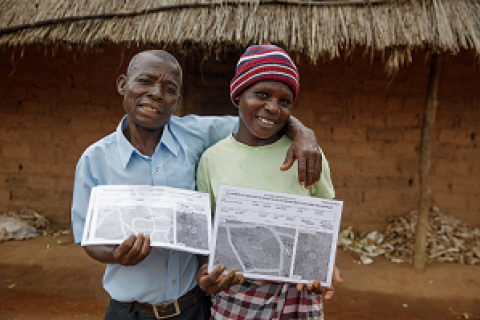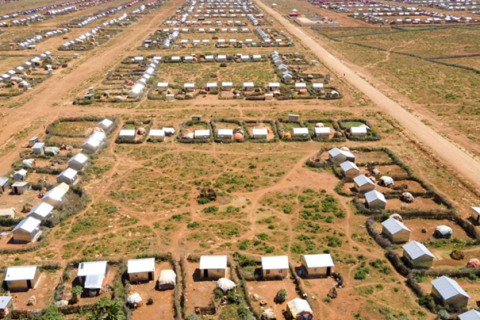
Topics and Regions
Programme advisor at RVO for the LAND-at-scale programme
Details
Affiliation:
Location
Contributions
Displaying 1 - 10 of 25LAND-at-scale Iraq Policy dialogue on legislative reform to improve land governance and secure tenure rights by registering and resolving land claims for vulnerable IDPs
Iraq has experienced several waves of mass displacement over the last forty years that have caused an intricate land and property situation. Land and property challenges have further been complicated by multiple causes of property loss, including expropriation by the Ba’ath regime, terrorism, sectarian violence, military operations, economic hardship, and a general climate of fear. Today, internally displaced people (IDPs) and returnees, including minorities, face major challenges in proving their ownership or occupancy rights, particularly where there is an absence of cadastral data, registry information, maps delimiting property rights, and a lack of official documents.
LAND-at-scale in Iraq consists of two complementary projects. UN-Habitat will initiate and conduct national policy dialogue on the reform of laws related to land governance to address challenges faced by Iraqis; while also contributing to securing tenure and protect housing, land and property (HLP) rights by registering and resolving land claims of IDPs and returnees in war-affected governorates in Sinjar. Secondly, The Hague Institute for Innovation of Law (HiiL) will identify existing small-scale initiatives addressing HLP issues in Sinjar and support these for further scaling and explore integration in the policy dialogue.
Three key strategies are employed:
- Inclusive policy dialogue to discuss the reform of the legal framework on land governance;
- Enhancing and protecting the security of tenure for selected IDPs and returneesthrough increased local capacity by applying the Social Tenure Domain Model (STDM) and providing legal assistance;
- Identify and support local HLP rights justice solutions
LAND-at-scale Egypt Participatory Land-Use Consolidation for Climate Resilience and Inclusive Business Models
Agriculture in Egypt, in particular in Upper Egypt, is characterised by smallholder farming. With a growing population (now 109 million people) and 4% of land being cultivatable concentrated along the Nile River, land fragmentation poses a substantial challenge, exacerbated by constrained land and water resources. This fragmentation results in the subdivision of agricultural land into smaller, irregular parcels, leading to the inability to carry out sustainable crop management, including pest control and efficient water use. Land fragmentation is one of the most important structural obstacles in organising agricultural production services and applying collective agricultural rotation, which are a necessary conditions for conserving natural resources and increasing efficiency. Furthermore, it is a major obstacle to the development of organised value chains and marketing systems. Thus, land fragmentation substantially undermines the productivity and income of smallholder farmers.
The project will aim to reduce land fragmentation through participatory land use consolidation for climate resilience and inclusive business models, to increase the productivity and income of smallholder farmers, and to strengthen the institutional capacity of key institutions on land governance aspects.
Four key strategies will be employed:
- Assessing the suitability and applicability of various land-use consolidation tools including the development of inclusive business models;
- Awareness raising, mobilizing communities, and strengthening capacities at the local, governorate, and national levels;
- Piloting land-use consolidation models, focusing on (1) crop consolidation and private sector engagement and (2) land-use consolidation tailored for climate adaptation including demonstration plots;
- Facilitating learning, knowledge dissemination, and policy advocacy in collaboration with the government to enable scaling up of successful practices.
LAND-at-scale is funded by the Netherlands Ministry of Foreign Affairs and managed by the Netherlands Enterprise and Development Agency (RVO). The project in Egypt is supported with 1.485.000 Euros. To stay updated on this LAND-at-scale project and others, please sign up(link is external)(link is external) for our quarterly newsletter.
Lessons Learned Saameynta programma - Somalia
This document lists the lessons learned, achievements, and challenges experienced by the Saameynta Joint programme (henceforth Saameynta) related to establishing durable solutions for internal displacement.
Workshop on Land Use Consolidation Egypt
The following report summarises the key take-aways and conclusions from the workshop organised on the 4th of June 2024 in Cairo focused on land use consolidation in Egypt.
Participatory Land-Use Consolidation for Climate Resilience and Inclusive Business Models in Egypt: Announcing the lauch of LAND-at-scale in Egypt
We are happy to announce the launch of the project Participatory Land-Use Consolidation for Climate Resilience and Inclusive Business Models in Egypt, which started in May 2024 and will run until October 2026. The project aims to reduce land fragmentation through participatory land use consolidation in order to increase the productivity and income of smallholder farmers, and to strengthen the institutional capacity of key institutions on land governance aspects.
LAND-at-scale Egypt
This one-pager provides details on the LAND-at-scale project in Egypt. This project is implemented by GIZ Egypt, and financed by the Ministry of Foreign Affairs via the Netherlands Enterprise & Development Agency (RVO).
Justice innovation in Iraq:Introducing the justice innovation component to the LAND-at-scale activities in Iraq
The Hague Institute for Innovation of Law (HIIL) and the Netherlands Enterprise Agency (RVO) are delighted to announce a new collaboration for complementary LAND-at-scale activities in Iraq. Activities focus on justice innovation and support: by scouting, vetting, selecting and supporting promising local and existing justice initiatives in Northern Iraq, HIIL aims to strengthen the localization of justice solutions for Iraqi people.
Scaling Community Land Rights Certification in Municipal Areas of Mozambique: the launch of a new LAND-at-scale project
Terra Firma and the Netherlands Enterprise Agency (RVO) are pleased to announce the launch of a new LAND-at-scale project: Scaling Community Land Rights Certification in Municipal Areas of Mozambique. The project started implementation this month (February 2024) in the rural hinterlands of four municipalities in Manica, Sofala and Zambezia provinces.
Reflection on LAND-at-scale side-event at CLPA 2023: Climate-Resilient Land Use Planning as a Tool for Addressing Land Degradation
During the Conference for Land Policy in Africa (CLPA) which took place in Addis Ababa in November 2023, LAND-at-scale organised the side-event ''Climate-Resilient Land Use Planning as a Tool for Addressing Land Degradation''. The LAND-at-scale (LAS) project partners and their government constituencies from Mozambique, Rwanda and Uganda participated in person. The set-up of the session was dynamic with each country first ‘pitching’ how land use planning processes were important in their LAS interventions, and then the government representatives adding to that a perspective from government. In each of the countries, the LAS partners consisting of NGOs and UN organizations, work closely with national or district land use planning officers of the government in carrying out project activities.
Understanding the link between Climate & LAND-at-scale country projects - Sustainable Solutions for Rural-Urban Migrants in Baidoa, Somalia
As part of a scoping study titled Land Governance for Climate Resilience: A review and case studies from LAND-at-scale projects headed by Richard Sliuzas, Emeritus Professor, University of Twente, IOM explored how climate plays a role in the UN-led Saameynta Joint Programme in Somalia. In this context, climate change is increasingly recognized as a multiplier of insecurity and fragility, where climate-related sudden and slow-onset disasters are driving people to leave their land and migrate. While migrating allows people to find alternative livelihoods and enhance their climate resilience, it can also be associated with instances of maladaptation to climate change. As such, this case highlights durable solutions in climate-driven urban sprawl in Baidoa.









